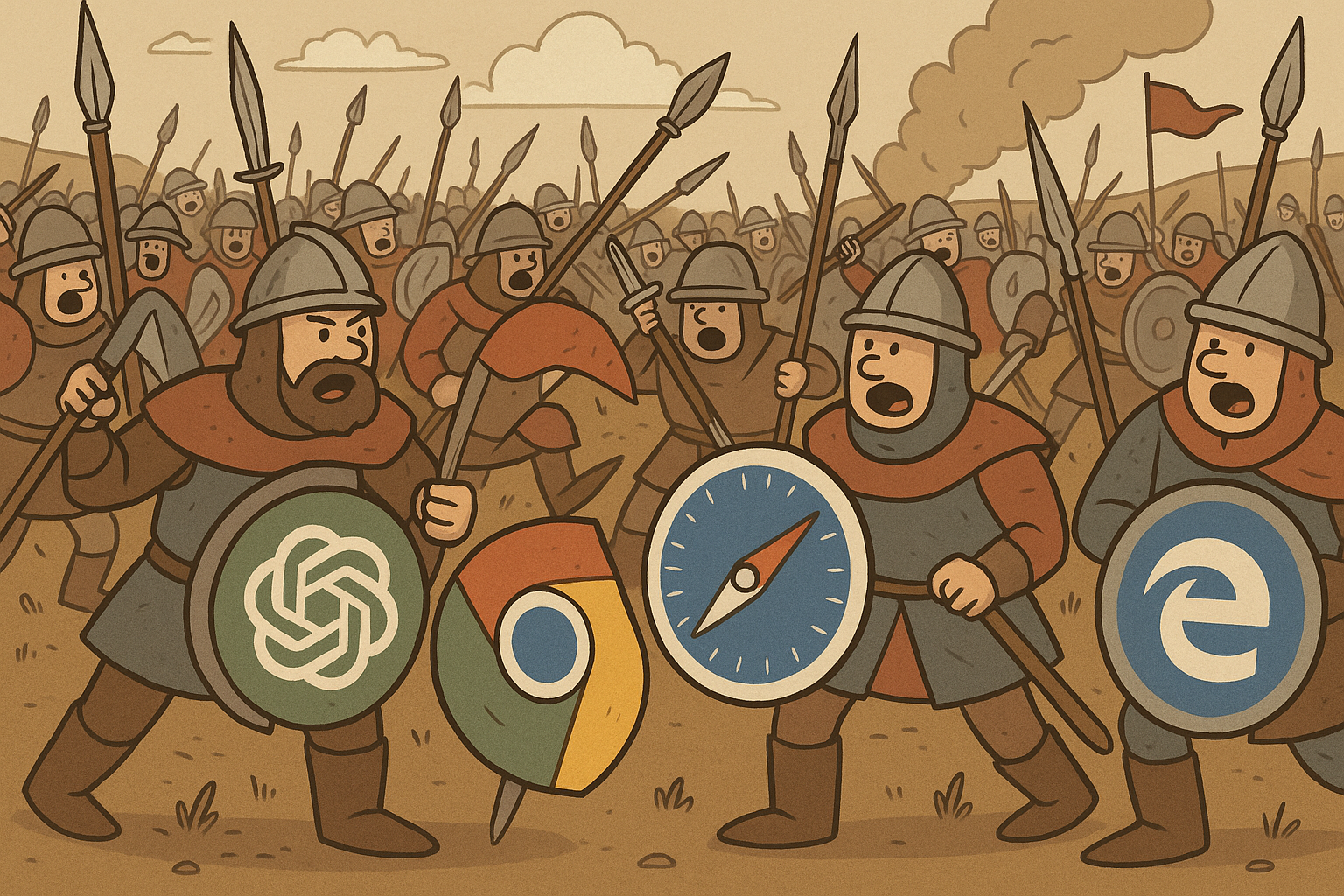We’ve been here before. Yet another start-up announces that it’s going to challenge the old guard by launching a browser that truly changes the way we search the web. Disappointment almost certainly follows.
But this time the claim might actually be worth noting. OpenAI just announced that it plans to launch an AI-powered browser. This browser integrates deeply with its LLM, and claims to let users perform sophisticated tasks like booking flights, making purchases, or completing complex forms, Just by asking questions or giving commands in plain language. This promises to turn browsing the web from passive clicking into dynamic, conversational interactions.
A Challenge to Google’s Dominance?
Built on (ironically) Chromium, OpenAI’s entry into the browser category is a challenge to Google Chrome, which currently commands a dominant 68% global market share. But it’s going to be a tough row to hoe. As the American DOJ claims, Chrome’s success stems from a seamless (and possibly monopolistic) integration with Google’s ecosystem and strategic default placements across Android devices. Apple’s Safari, Microsoft’s Edge, and Mozilla’s Firefox tout privacy features and tight integration with their parent company’s products, yet together struggle to control just 25% of the browser market.
Lessons from Browser History
Browser history offers critical lessons: user adoption follows ease of access, performance, security, and integration. Internet Explorer once reigned by being pre-installed on Windows PCs, steamrolling early innovator Netscape Navigator. Mozilla Firefox briefly gained traction by offering speed and better web standards compliance. Ultimately, Google Chrome outpaced them all by offering superior performance and integration with widely-used Google services and Android phones.
How OpenAI Intends to Change Browsing
OpenAI’s AI-powered browser flips traditional browsing on its head. Instead of navigating through pages of search results, users can engage directly in conversation with an AI assistant, who manages tasks end-to-end. A request like “Book me a great sushi restaurant tonight nearby” could happen seamlessly, without the user ever clicking through multiple websites.
That said, reports (including our own) of websites’ demise are likely premature. While AI browsers will simplify informational tasks, deeper interactions such as online shopping, interactive tools and detailed exploration will still rely heavily on website visits. AI might initiate tasks or summarize information, but complex interactions will continue to draw users directly to websites. For now.
Marketing in the Age of AI Browsing
For us digital marketers, this transformation has critical implications. Traditional SEO will evolve into strategies that position brands as authoritative sources for AI-generated responses. This means focusing on authority and structured data. Brands should provide content with clear answers to likely questions (which AI might pick up) and use schema markup or data feeds that AI tools can easily parse. Content quality and credibility will become even more crucial, because AI models prefer to draw from reliable sources and some AI search experiences already label things like “highly cited” responses.
In an AI-dominated interface, brand trust and recognition will also become more important (did it ever stop being important?). If a user is just getting an answer from an AI, having your brand be the one the AI references (e.g., “according to YourCompany’s research, the answer is…”) can help keep you in the conversation even if the user doesn’t click through immediately.
Reduced direct traffic due to AI-driven answers demands a rethinking of analytics and attribution. Marketers will need innovative ways to measure indirect engagements initiated by AI-driven browsing, making it crucial to understand user behaviors facilitated by conversational AI.
Advertising strategies must evolve alongside these changes. Traditional ads may be integrated directly into conversational AI responses. Marketers might explore new partnership models, conversational commerce opportunities, or sponsored conversational content to maintain visibility in this new landscape. Reduced third-party tracking capabilities from browsers such as Chrome and Safari will force fundamental changes on how we target ads. We will lose access to user identifiers and behavioral data as a result. This will mean a heavier reliance on first-party data (data you collect directly from customers via sign-ups, etc.), and contextual advertising (targeting based on page context rather than individual profiles).
And wither Google Ads? Will they simply not exist in the OpenAI browser?
Act Now!
OpenAI’s new browser reflects a larger trend: AI-assisted digital interaction. The day when we stop pecking out commands on keyboards and screens is finally in sight. Marketers must adapt by adopting AI-driven strategies, embracing content creation, mastering new attribution techniques and innovating advertising as the browser evolves from a navigation tool into an intelligent, proactive digital assistant.
